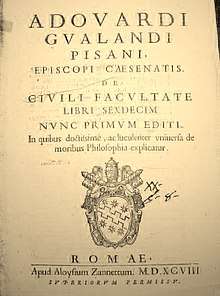Odoardo Gualandi
Odoardo Gualandi[1] descended from an old and famous patrician family from Pisa.[2] At the university of Bologna he graduated summa cum laude in civil and canon law.[3] From 1557 till 1588 he was Bishop of Cesena in northern Italy. In that capacity Gualandi organized several synods. The synod in 1582 resulted in his first publication, Constitutiones, et decreta condita ab illustri...Adoardo Gualando...Caesenae. 1584. In 1588 Gualandi retired and was succeeded as Bishop of Cesena by his nephew Camillo Gualandi. During his retirement he wrote his only known philosophical treatise, De civili facultate Libri XVI. It was published by his nephew in 1598, i.e. a year after his death in Rome, 17 March 1597.[4] The treatise shows Gualandi as an eclectic Aristotelian who attracted attention not so much as an original thinker as well as for the way he organized the material in his explanation of ethics and politics. Gualandi was reputed for his clear explanation of moral philosophy in general and that of Aristotle in particular.[5] His fame as a teacher lasted till the beginning of the eighteenth century. Since then his name and work passed into forgetfulness.

Bibliography
- Braschio, J.B. - Memoriae Caesenates sacrae et profanae. Romae. 1728
- Gabrielis Naudaei Bibliographia politica. Venetiis. 1633
- Grassi, Rainieri Descrizione storica e artistica di Pisa. Parte storica. Pisa. 1836
- Gualandi, Adoardi De civili facultate libri XVI... In quibus doctissimè, ac luculenter universa de moribus Philosophia explicatur. Romae. apud Aloysium, Zannettum. 1598
- Prosperi, Ranieri Discorso Accademico Sull' Istoria Letteraria Pisana. Pisa. 1787
See also
Notes
- His first name is also written as Edoardo, Adoardo, Adoardus, Odoardus, Aduardus, Adouardus, Eduardus and Oduardus. As for his last name he is also referred to as Gualando, Gualandius and Gualandinus.
- In the Middle Ages the Gualandi family supported the Ghibellines and it was one of the families that the Archbishop Ruggieri degli Ubaldini incited against Ugolino della Gherardesca. The Gualandi family is also cited by Dante Alighieri in the Inferno (XXXIII, 33). (https://it.wikipedia.org/wiki/Gualandi) See also Grassi, Ranieri - Descrizione storica e artistica di Pisa. Parte storica. Pisa. 1836.
- See Braschio, J.B. Memoriae Caesenates sacrae et profanae. Romae. 1728, pp. 375-378
- Gualandi, Adoardi De civili facultate libri XVI... In quibus doctissimè, ac luculenter universa de moribus Philosophia explicatur. Romae. apud Aloysium Zannettum. 1598. In some sources Gualandi is said to have written also a Tractatus de philosophia. (See for example Discorso Accademico Sull' Istoria Letteraria Pisana. Ranieri Prosperi. Pisa. 1787, p. 119)
- See Gabrielis Naudaei Bibliographia politica. Venetiis. 1633, p. 15